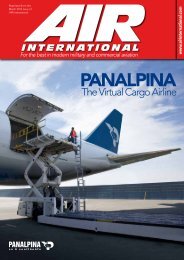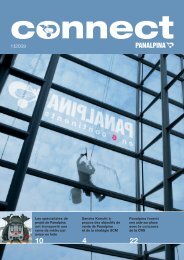Panalpina Annual Report 2006
Panalpina Annual Report 2006
Panalpina Annual Report 2006
Create successful ePaper yourself
Turn your PDF publications into a flip-book with our unique Google optimized e-Paper software.
Nationalities in top management<br />
Number<br />
Switzerland<br />
Germany<br />
USA<br />
Netherlands<br />
France<br />
China<br />
Canada, Columbia, Denmark, Italy, Panama,<br />
Sweden, Spain, South Africa, United Kingdom<br />
Fostering further training at all levels…<br />
About one third of all <strong>Panalpina</strong> staff hold managerial<br />
functions, in which they are supported<br />
by guidelines and tools that are uniform throughout<br />
the world. These standards include annual meetings<br />
with all employees to discuss their progress<br />
and their careers, as well as the active encouragement<br />
of initiatives to stimulate feedback and<br />
suggestions from the workforce. Under the name<br />
Panacademy, the Group has for many years<br />
offered a widely diversified range of professional<br />
training courses, enabling its employees to bring<br />
their expertise up to the highest industry levels.<br />
… including management<br />
It’s not only employee training that <strong>Panalpina</strong> takes<br />
seriously: it also offers its many talented managers<br />
a program designed to develop their potential.<br />
During the year under review, 172 managers completed<br />
the first module of this triedandtested<br />
training package, while 56 completed the second.<br />
The launch of a third module is scheduled for<br />
2007. This will offer supplementary courses to<br />
top managers, from managing director level up.<br />
3<br />
10<br />
2<br />
18<br />
1 1 1 1 1 1 1 1<br />
1<br />
Participants in training programs for managers<br />
North America<br />
Central and South America<br />
Asia / Pacific<br />
Head office (Basel)<br />
Europe / Africa / Middle East / CIS<br />
5<br />
3<br />
19%<br />
14%<br />
12%<br />
38%<br />
17%<br />
Sustainable development of management<br />
potential<br />
In addition, <strong>2006</strong> saw the initiation of a structured,<br />
qualitycontrolled program to groom the successors<br />
to the Group’s current generation of managers.<br />
With the assistance of an external assessment<br />
company, this is designed to ensure that wherever<br />
possible, key managerial positions can be filled<br />
even more successfully with suitable internal<br />
candidates. This places the retention of internal<br />
expertise and the sustained development of experienced<br />
middle and senior managers on a sound<br />
longterm footing.<br />
Performancerelated salary models<br />
<strong>Panalpina</strong> is seen as an attractive employer within<br />
the sector, not least because due to its willingness<br />
to reward aboveaverage performance. <strong>Panalpina</strong>’s<br />
competitive salary models are based on performance<br />
incentives linked to the operating targets<br />
of the Group, the region and the relevant business<br />
unit, while also taking account of individual performance<br />
targets. Senior managers were allocated<br />
share options at the time of the Group’s flotation in<br />
2005 to enable them to participate in its success,<br />
and in <strong>2006</strong> this was followed by a similar program<br />
for managers on the next level down (see page 65).<br />
This also met with great interest.<br />
www.panalpina.com/jobs<br />
Sustainable Growth<br />
<strong>Panalpina</strong> <strong>Annual</strong> <strong>Report</strong> <strong>2006</strong> 55



![Eigenes Luftfrachtnetzwerk [pdf | 244 KB] - Panalpina](https://img.yumpu.com/23347328/1/184x260/eigenes-luftfrachtnetzwerk-pdf-244-kb-panalpina.jpg?quality=85)
![Übersicht Panalpina [pdf | 240 KB]](https://img.yumpu.com/22547731/1/184x260/ubersicht-panalpina-pdf-240-kb.jpg?quality=85)

![Seefracht [pdf | 181 KB] - Panalpina](https://img.yumpu.com/22234724/1/184x260/seefracht-pdf-181-kb-panalpina.jpg?quality=85)



![Annual Report 2012 [pdf | 1 MB] - Panalpina](https://img.yumpu.com/15342099/1/184x260/annual-report-2012-pdf-1-mb-panalpina.jpg?quality=85)






